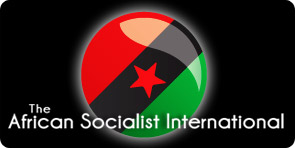Political Report to the Fifth Congress of the African People’s Socialist Party
Join the online studies / discussions: May 2 | May 9 | May 16
Table of Contents
- Imperialists cannot stem tide of national liberation
- The Party is the anti-colonial force in this time
- African People’s Socialist Party is heir to Marcus Garvey
- Pan-Africanism was the petty bourgeoisie; Garvey led the African working class
- African Internationalism advances Garvey Movement, defines imperialism in crisis
- African Internationalism shows the way forward
- African Internationalism led on the issue of reparations
- African workers must lead the struggle against parasitic capitalism
- ASI is the basis for a genuine Communist International
- White nation-state built on pedestal of slavery, colonialism
- White communists must be committed to overthrowing white power
- The African Socialist International is growing in Africa
- ASI resolution adopted at Party’s First Congress
- InPDUM leads mass resistance
- Revolutionary National Democratic Program: the political basis for black power
- Black is Back Coalition helps to advance RNDP
- African People’s Solidarity Committee another vehicle against U.S. imperialism
- White people must side with African workers not parasitic capitalism
- AAPDEP a tool against parasitic capitalist development
- AISO wins students to African Revolution
- African Redemption Church: the Party’s response to religious idealism
- Influencing and organizing African labor
- Party must address issue of African mass incarceration
- Formalizing the leadership of African women
- Solve the problem of recruitment
- Accountability and democratic centralism
- Party’s Department of Agit Prop has made great leaps
- Cadre development and leadership is key
- Office of Economic Development builds culture of self-reliance
Formalizing the leadership of African women
Our Party has always believed in the equality of African men and women and held up the leadership of women in our Party and Revolution. For years our position on the question of women in the Party and the world has been summed up in our platform with these words:
“We want an end to the political and social oppression and economic exploitation of African women. We believe in the absolute, unequivocal, political, social and economic equality of African women and men. We believe that a fundamental test of the progressive or revolutionary character of any organization, party, movement or society is its commitment, confirmed in practice, to the destruction of the special oppression of women and the elevation of women to the rightful place as equal partners and leaders in the forward motion of the development of human society and as leaders, makers, and shapers of human history.”
Our commitment on the question of women’s role in society has always been reflected in the leadership of our Party, where women have historically been well represented and sometimes in the majority. However, we have never structured our Party or our work in a manner to guarantee that concerns and issues critical to the progress and protection of women were always considered and advanced as a natural aspect of all our work.
I am not speaking here of feminism, a bourgeois philosophy that advances a biological analysis that liquidates or minimizes issues of class exploitation and national oppression. We recognize that there really is no such thing as women in general, that there is a huge distinction between the women of the slave owning oppressor nation and the women of the enslaved oppressed nation. All available social and economic data reveal that while there are contradictions between the men and women of the colonizer nation, they are contradictions that play themselves out on the pedestal of the oppression of the colonized or oppressed nation.
The truth is that the oppressor nation can and does resolve fundamental contradictions between oppressor nation men and women at the expense of the whole people of the oppressed nation. North American women do win the “right” to occupy prominent places in oppressor nation military forces that are currently murdering men, women and children all over the world, especially in the Middle East and police operations of the barrios and African domestic colonies of the U.S.
But African women, who often bear the brunt of the attacks on our whole people, are catching hell. It is they who suffer the vicious humiliation and degradation associated with the definition of all women who experience bourgeois rule. But African women also suffer the consequence of being of an oppressed nation that is defined as bestial and inhuman by the ruling class of the oppressor nation.
Additionally, as women of an oppressed nation from which value is extracted at the expense of the ability of the oppressed nation to produce and reproduce real life, African women and girls in most places find themselves reduced to beasts of burden fighting for the survival of themselves, their children and families.
African women and girls carrying massive loads on their heads while walking miles, sometimes with the firewood that they will then have to use to cook for their families, is a common site on the Continent. Women and girls carrying pails of water balanced on the two ends of poles across their shoulders after having walked all day to procure it, is an iconic sight, consigned to inanimate mental postcard status that reduces the sense of brutality associated with such cruel labor.
The success of the white ruling class and colonial state in breaking up the colonially-imposed monogamous form of the family has resulted in huge concentrations of housing projects and other communities with households headed by single African women left to fend for themselves and their children.
Welfare and other so-called social safety nets that provide “aid” for families do so with a stipulation that there cannot be a man in the house. This “help” from the colonial state, assisted by the mass incarceration of African men, not only leads to women headed households, but it also heaps artificial contradictions between African men and women onto an already precarious situation.
All too often African women see their children being kidnapped by direct agents of the bourgeois state in places like the U.S., where the children become commodities as foster children or juvenile prisoners. Or, there is the indirect, state-aided kidnapping of their children by white celebrities or agencies whose actions are characterized as charitable benevolence.
Men within our oppressed communities also sometimes subject African women to horrible brutality. Rapes, beatings and even murders of women are not uncommon and are too often viewed with macho approval. These are contradictions of horizontal violence that demand a response by our Party.
They are contradictions that flow from the European-based bourgeois assumption that women are the property of men. They are contradictions that are highly influenced by the reality of bourgeois private property resting on a foundation of Africans ourselves as the primary or primitive private property that gave birth to the capitalist social system. They are contradictions that are inflamed and provoked by the imperialist disruption of African life and the substitute synthetic foundation of colonial society.
African women also find themselves locked into backward social practices that have assumed the weight of culture. Genital mutilation is one of the most obvious of such practices. While there is debate on whether this practice was introduced into Africa by Arabs or other external forces, the fact remains that genital mutilation is a brutal method used in attempt to guarantee male inheritance rights by limiting the sexual freedom of women.
Backward notions of “men’s and women’s” work also limit women. While some such differentiation may have been valid at one point, the fact is that technology has eliminated much of such differentiation that was often based on physical strength.
Today, when work is done by computer or motorized tractor, there is little justification in attempting to prevent women from participation in much of the production process based on physical differences.
This means that in places where the technology has been denied us because of imperialist domination, we must understand that the struggle for technology is a part of the struggle for the emancipation of women. By the same token, the technology that facilitates women’s expanded participation in the labor force contributes to the equalization of men and women in the participation of household labor, previously known as women’s work.
Our Party must initiate serious struggle against the deplorable conditions suffered by African women. This includes the attitudes that afflict men (and women) who have bought into the notion that women are incapable of leading or that the measure of the worth of a man is his capacity to oppress women.
I am proposing that the Party’s Constitution be amended to create a women’s commission as a permanent position in the leadership of the Party. This is in addition to women who always occupy leadership in the Party in different capacities, as has been our history. This is also different from the concept of dual leadership comprised of men and women. The responsibility of the women’s commission would be representation of the interests of African women. It would be to organize women to fulfill their roles as revolutionaries that will help to determine the future of women through their fully conscious, organized participation in defining and creating that future.
One such project for this commission would be the organization of an African National Women’s Organization (ANWO). ANWO could become the powerful home to African women who are constantly under some form of assault by a myriad of contradictions peculiar to African women. ANWO would provide a mass organization for women who need to confront their oppression and exploitation. It would allow the Party to develop a reserve for the Revolution through helping women to recognize the universal contradictions confronting our people and class that are located in the specific contradictions they are confronting as women.














